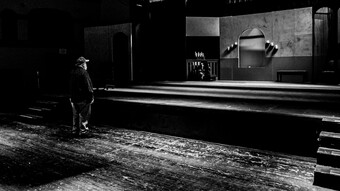In Search of the Artistic Home
Jamie Gahlon has asked theatre artists from around the country to talk about their personal search for an artistic home. Anna Ziegler continues this series.
What makes an artistic home?
On the one hand, an artistic home is a theatre you know will always have you back, and have your back. I think this can take many forms, but most important is that the theatre has been explicit about making you part of the family. Its artistic director or literary manager knows you personally, and seems to enjoy your company in addition to your work. Here, people ask you what you most need and would find most beneficial. They’re willing to read more than one draft of your plays and generally work hard to include you in the life of the theatre, even when unable to produce your work in a given season.
In another sense, an artistic home is a community. In New York City, I can’t go see a play without running into any number of theatre artists I know, and this makes our community in New York feel small, warm, and much less intimidating. In this way, artistic homes are, essentially, people—the people you trust most, and with whom you are never embarrassed to share your work or talk about the latest round of rejections. In theatre, we need those people we can truly confide in, and they are our homes.
In this way, artistic homes are, essentially, people—the people you trust most, and with whom you are never embarrassed to share your work or talk about the latest round of rejections. In theatre, we need those people we can truly confide in, and they are our homes.
Where and how did you find yours and what does it mean to you?
In my experience, most playwrights don’t have a single artistic home, but a number of theatres that nurture their career at various points along the way.
The Lark Play Development Center, where I wrote my first play in the summer of 2001 in its inaugural Playwrights’ Workshop, was my first home, and continues to be important to me. Not only did my first experience there lead me to become a playwright (and how could it not have—it was the summer after I graduated from college and I felt overwhelmed just to be included in such a group—with Anton Dudley, Noah Haidle, Andrea Thome, among others, and helmed by Arthur Kopit) but the Lark has been a home since then, and has seen me through the writing of many more plays, all of which were of course more excruciating to create than that first play. The Lark is a home to many artists, and yet serves them all. Any playwright affiliated with the Lark can arrange a round-table to hear a new play for the first time or to hear a rewrite. I’ve also been lucky enough to be included in a number of their writing groups over the years (one of which was facilitated by the amazing Linsay Firman, who eventually led me to another artistic home, EST), and in 2011 participated in two Lark-sponsored residencies—a writing retreat at Theresa Rebeck’s home in Vermont and a workshop at the University of Illinois. It’s so important for playwrights to get away every now and then and actively do work with and around other people, and the Lark understands that.
Over the years I have found other homes as well, including EST, The McCarter Theatre, New Georges, Theater J, The Chautauqua Theatre Company and The Playwrights Realm. I can’t imagine what my life and career would have been like without them.
How can one create and/or build an artistic home for others?
I’ve been pondering this question lately, as my friend and collaborator, Zohar Tirosh-Polk, and I set out to create just such a home. We aim to start a company that will focus on Israel and Judaism in new ways. We plan to start small, with a number of discussion-based salons, and hope to ultimately commission work.
We actually had our first salon the other night and as I observed the nine people sitting in a circle in my living room, enthusiastically discussing their personal relationships with Israel, I realized that their enthusiasm came less from the passion of the topic (which isn’t inconsiderable) but from having a place to talk, and the promise of a new community. I think people, at base, long to belong, to find a niche, and that’s even more crucial in the difficult environment of theatremaking where so many of us live but are homeless at the same time.
What is the artistic home of the future?
Gosh, I don’t know. The MarsCarter? The Lark Play Development Space Station? Bad jokes, and I’m sorry for them. Please don’t exile me from my home…












Comments
The article is just the start of the conversation—we want to know what you think about this subject, too! HowlRound is a space for knowledge-sharing, and we welcome spirited, thoughtful, and on-topic dialogue. Find our full comments policy here